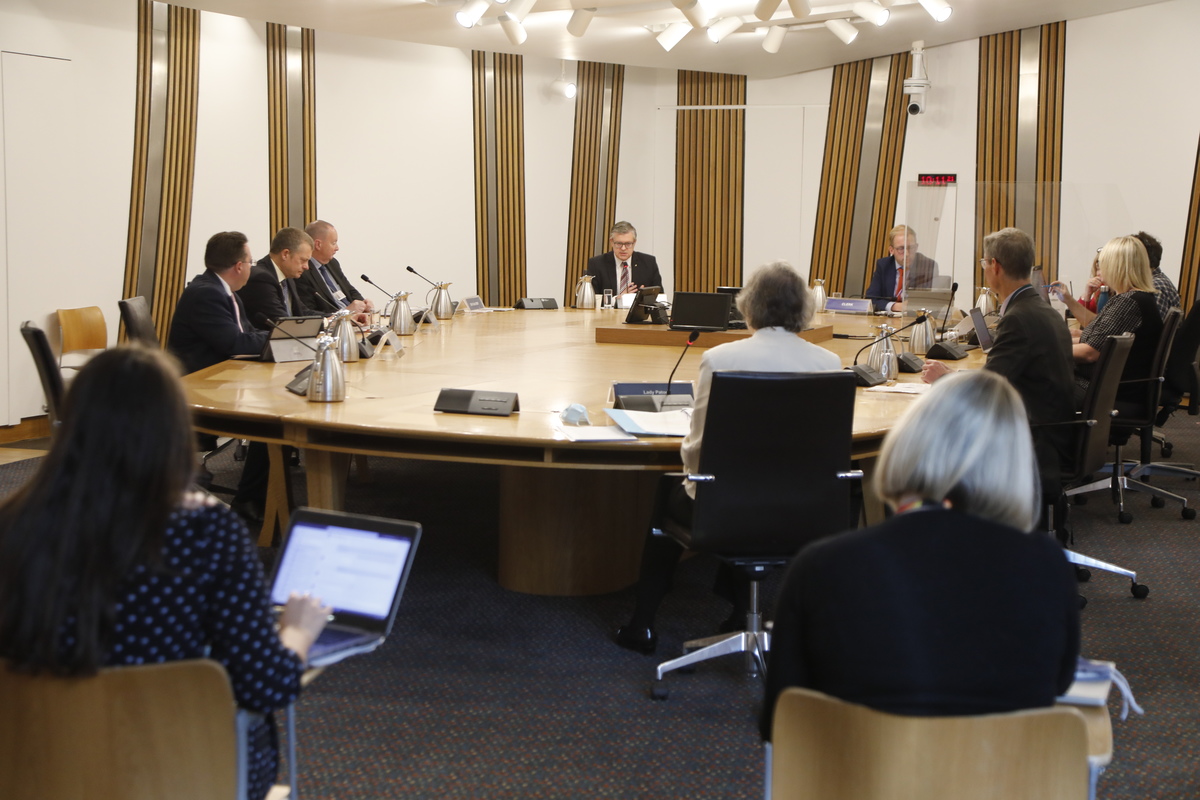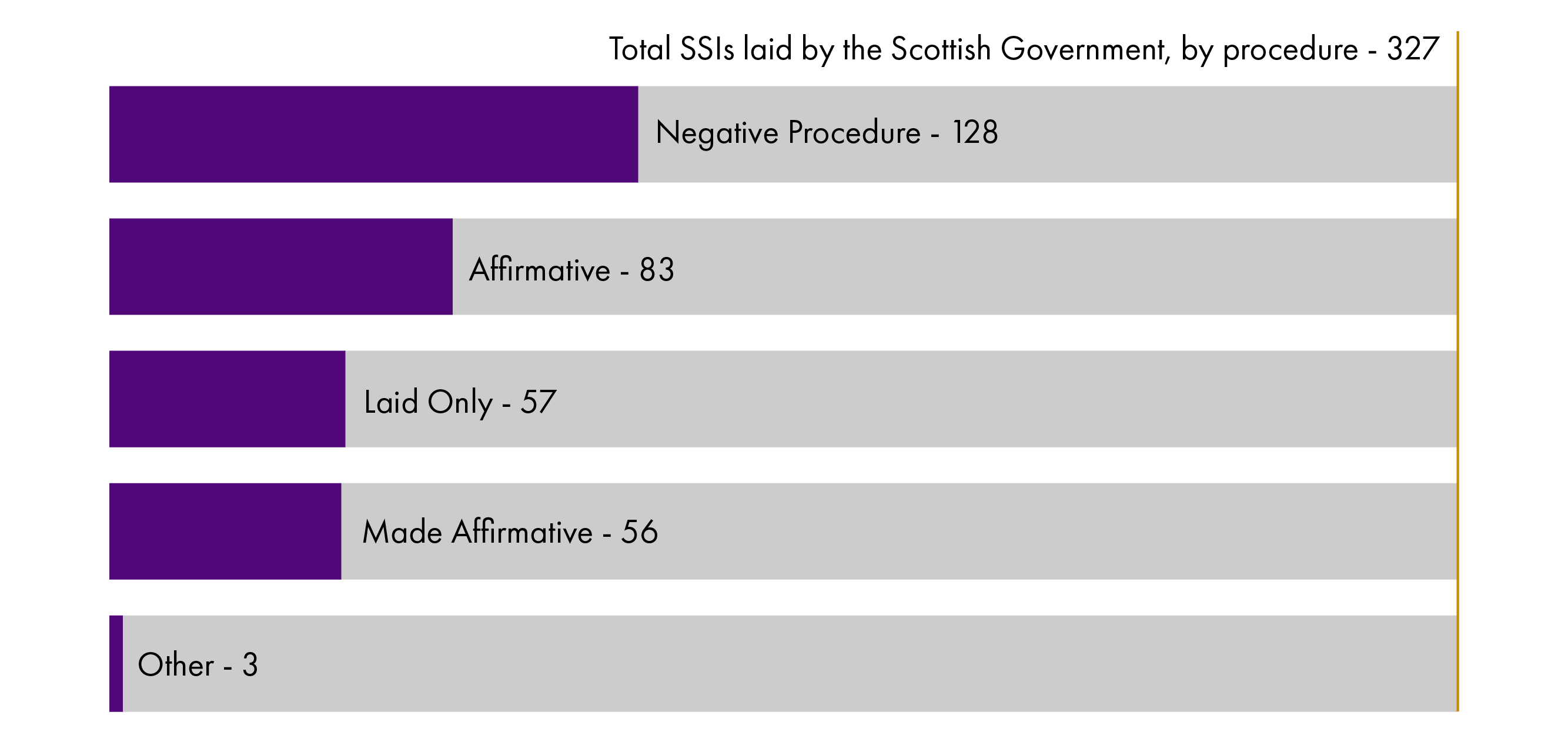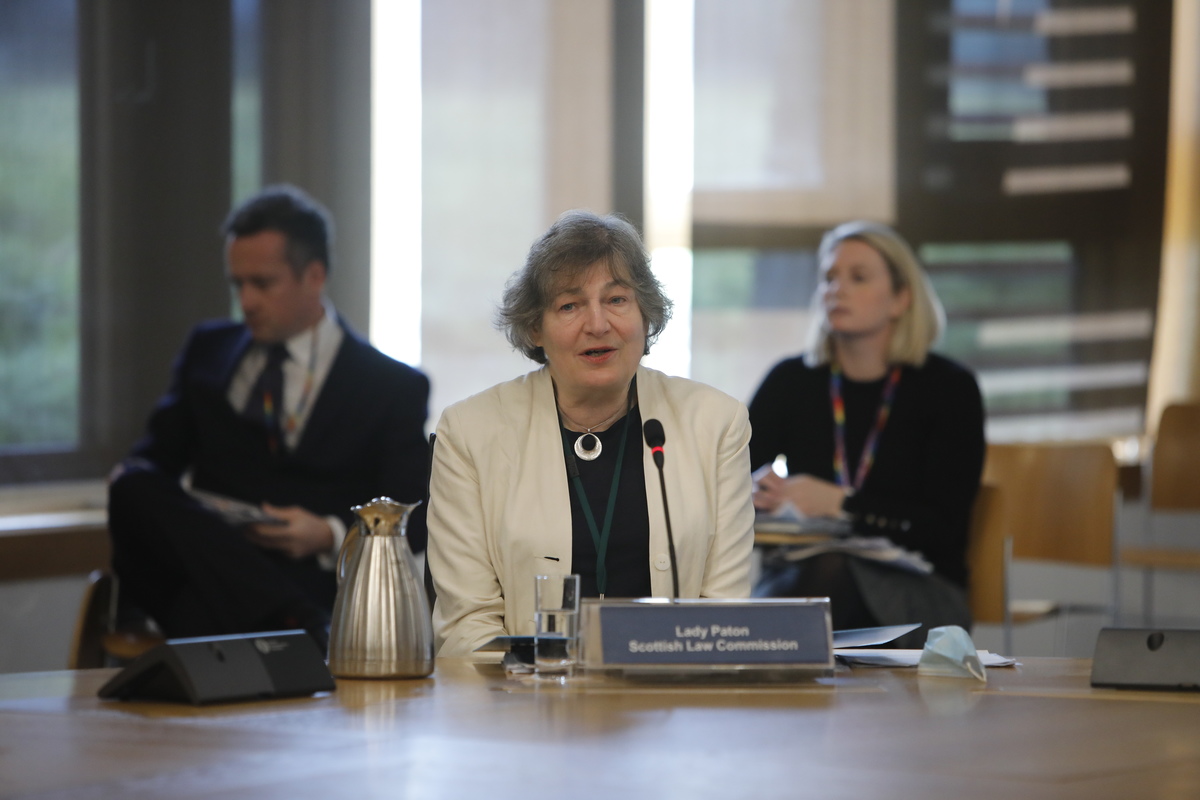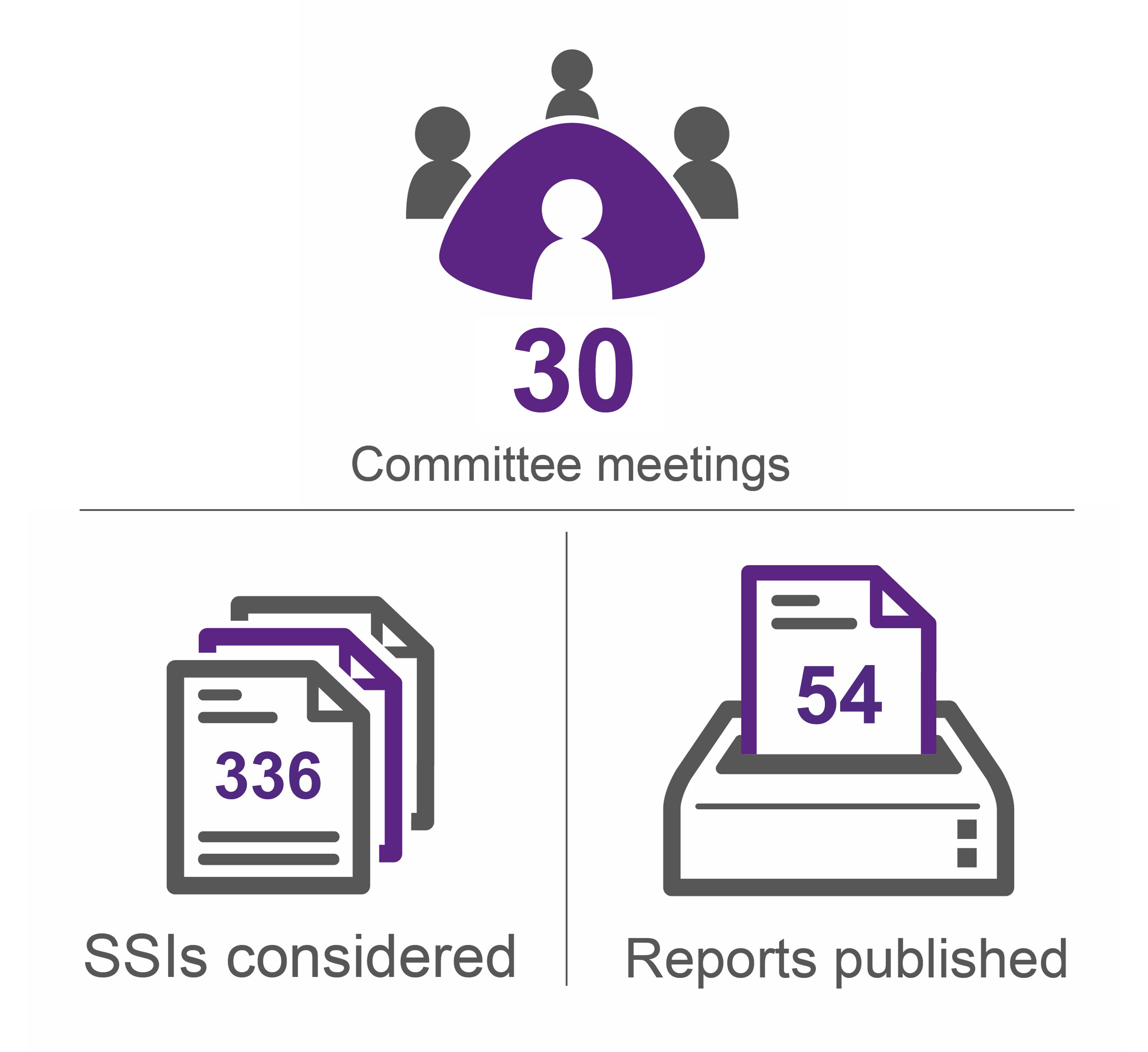Delegated Powers and Law Reform Committee
Delegated Powers and Law Reform Committee Annual Report 2021-22
Introduction
This Report covers the work of the Committee during the parliamentary year from 13 May 2021 to 12 May 2022. The Committee scrutinises Scottish Statutory Instruments ('SSIs'), delegated powers provisions within bills at Stage 1 and after Stage 2 as well as UK bills which contains provisions conferring on the Scottish Ministers powers to make subordinate legislation.
Committee taking evidence 
Subordinate Legislation
The Committee considered 336 SSIs during this parliamentary year; a decrease of 14% of SSIs considered in the 2020-21 parliamentary year period.
Working to tight timescales, the Committee also produced 30 SSI reports.
327 of these instruments were laid by the Scottish Government and 9 by the Lord President's Private Office.
In relation to the 327 instruments laid by the Scottish Government:
83 were subject to affirmative procedure;
56 were subject to made affirmative procedure;
128 were subject to negative procedure;
57 were not subject to any parliamentary procedure (Laid only); and
3 instruments/document subject to approval.

Bills
Introduction
The Committee considers delegated powers provisions in Scottish Government and Members’ bills. It then reports to subject committees and the Parliament on issues such as the scope of delegated powers and whether parliamentary procedure that would apply to subordinate legislation brought under the power would offer the appropriate level of scrutiny.
Through its scrutiny process, the Committee aims to ensure that the appropriate balance between primary and secondary legislation within bills is maintained and that the Parliament will have appropriate scrutiny of subordinate legislation.
Over the reporting period, the Committee considered and reported on 10 bills at Stage 1:
Carer’s Allowance Supplement (Scotland) Bill
Transvaginal Mesh Removal (Cost Reimbursement) (Scotland) Bill
Coronavirus (Discretionary Compensation for Self-isolation) (Scotland) Bill
Good Food Nation (Scotland) Bill
Budget (Scotland) Bill
Hunting with Dogs (Scotland) Bill
Scottish Local Government Elections (Candidacy Rights of Foreign Nationals) Bill
Fireworks and Pyrotechnic Articles (Scotland) Bill
Coronavirus (Recovery and Reform) (Scotland) Bill
Gender Recognition Reform (Scotland) Bill
The Committee also considered and reported on 1 bill after Stage 2:
Coronavirus (Discretionary Compensation for Self-isolation) (Scotland) Bill
Legislative Consent Memorandums
Introduction
Legislative Consent Memorandums ('LCMs') are related to UK Parliament bills which seek to change the law or alter Scottish Ministers’ or the Scottish Parliament’s powers in relation to devolved matters.
The Committee considered and reported on 12 LCM's :
Environment Bill
Social Security (Up-rating of Benefits) Bill
Professional Qualifications Bill
Police, Crime, Sentencing and Courts Bill
Health and Care Bill
Animal Welfare (Kept Animals) Bill
Elections Bill
Building Safety Bill
Cultural Objects (Protection from Seizure) Bill
Public Services Pensions and Judicial Offices Bill
Economic Crime (Transparency and Enforcement) Bill
High Speed Rail (Crewe - Manchester) Bill
Inquiry into use of the made affirmative procedure during the coronavirus pandemic
The made affirmative procedure allows an SSI to be made and come into force even though it has not yet been approved by the Parliament. However, it cannot remain in force beyond a specified period of time (often 28 days) unless it is subsequently approved by the Parliament.
In November 2021 the Committee agreed to hold an inquiry into the use of the made affirmative procedure during the coronavirus pandemic. It published its report on 10 February 2022 and held a Chamber debate on 22 February.
The Committee regularly acknowledged that made affirmative instruments have allowed the Scottish Government to respond quickly to the many challenges presented by coronavirus. However, the Committee considered that bringing such substantial changes into force immediately, before any parliamentary scrutiny, should only be used if essential. Such emergency powers should not, as the Committee heard from witnesses during the inquiry, become a habit.
The Committee’s recommendations were to ensure a balance of power between the Scottish Parliament and the Scottish Government. It therefore highlighted a set of principles that might provide the basis for parliamentary scrutiny where legislation includes such provisions.
In its subsequent report on the Coronavirus (Recover and Reform) (Scotland) Bill on 29 March, the Committee based its recommendations on its findings during its inquiry. Namely:
that each SSI is accompanied by a written statement explaining and providing evidence for why the regulations need to be made urgently;
that the Government include an assessment of the impact of the instrument on all those likely to be affected; and
that such SSIs are subject to a sunset provision so that the changes to the law don’t continue to be in force indefinitely.
These recommendations were subsequently endorsed by the COVID-19 Recovery Committee. In its response to the Committee’s Stage 1 report, the Scottish Government said that it is intending to bring forward an amendment to provide an explanation of urgency and is also considering adding a sunsetting provision to the powers at Stage 2.
The Committee is also working with the Scottish Government to develop a protocol for an ‘expedited affirmative procedure’. This could be used in place of the made affirmative procedure. The Committee hopes the protocol might provide a framework for parliamentary scrutiny, on a case-by-case basis, if the Scottish Government wishes to bring forward an affirmative SSI which the the Parliament is able to consider in a shorter timeframe than usual .
European Union (Withdrawal) Act 2018
Instruments considered under the European Union (Withdrawal) Act 2018
The SSI Protocol was designed to ensure that SSIs laid by the Scottish Government under the European Union (Withdrawal) Act 2018 (“the 2018 Act”), to fix legislative deficiencies stemming from the UK leaving the EU, received the right level of careful scrutiny.
The Committee considered 9 instruments laid under “the 2018 Act” in the first year of Session 6. The protocol requires each instrument laid under schedule 2 the 2018 Act to be considered in terms of the scrutiny procedure attached to the instrument by the Government and the Government’s assessment of the instrument’s significance in terms of policy impact.
Of these 9 instruments, the Committee was content in all cases with the procedure chosen by the Scottish Government. On one occasion, the Committee recommended that the Scottish Government’s categorisation of an instrument be raised from Low to Medium.
In April 2022 the Committee considered whether the SSI Protocol might be discontinued. It noted that the project to fix deficiencies in retained EU law is now largely complete. In addition, scrutiny is now shifting towards instruments which set the new policy direction in post-EU areas. Such instruments are not covered by the SSI Protocol. The Committee nevertheless considered that the information provided in the Policy Notes accompanying SSIs to fix deficiencies in retained EU law has been extremely useful for committees.
The Committee has therefore written to the Minister for Parliamentary Business to propose that the SSI Protocol be discontinued, subject to an assurance that the Scottish Government continues to provide the same level of information in its Policy Notes accompanying any SSIs as that provided for instruments formerly covered by the SSI Protocol.
Meetings
The Committee met 30 times during the parliamentary year.
As a result of the coronavirus pandemic:
25 of these meetings were held as 'hybrid meetings'. Some Members participated in the meeting in person in the Scottish Parliament and others participated remotely via the ‘bluejeans’ online platform; and
5 meetings were held wholly virtually via ‘bluejeans’.
Of these meetings, none were entirely in private and four were entirely in public. The main reasons for taking business in private were to consider the Committee’s approach to delegated powers in bills, to consider draft reports or to consider oral evidence heard earlier in the meeting.
The Committee held 6 evidence sessions, during this Parliamentary year—
George Adam MSP, Minister for Parliamentary Business on the work of the Committee in the parliamentary year 2020-21 (14 September 2021);
Lady Ann Paton, Chair and Charles Garland, Interim Chief Executive, the Scottish Law Commission (28 September 2021);
On the Made Affirmative Inquiry, it heard from—
Dr Ruth Fox, Director, Hansard Society and Morag Ross QC, Faculty of Advocates (7 December 2021);
Professor Stephen Tierney, Professor of Constitutional Theory, School of Law, University of Edinburgh and Sir Jonathan Jones, QC, Linklaters LLP (14 December 2021);
John Swinney MSP, Deputy First Minister and Cabinet Secretary for Covid Recovery (11 January 2022).
The Committee also heard from John Swinney MSP on two made affirmative instruments (1 March 2022).
The Committee held an evidence session, during this Parliamentary year, with George Adam MSP, Minister for Parliamentary Business on the work of the Committee in the parliamentary year 2020-21 (14 September 2021). It also heard from the Deputy First Minister and Cabinet Secretary for Covid Recovery on the Committees work in relation to the made affirmative procedure (11 January 2022).
Since its evidence session with Lady Paton, the Committee has written to the Scottish Law Commission, the Scottish Government and the Local Government, Housing and Planning Committee in relation to the Commission’s ongoing work on tenement property and common repairs.

The Committee published a total of 54 reports over this parliamentary year.

Equalities
The Committee considers equalities issues which can arise under the European Convention on Human Rights and under Community law. It is part of the Committee's remit to draw the attention of lead committees and the parliament to any instrument that, in its opinion, fails to comply with any such requirement.